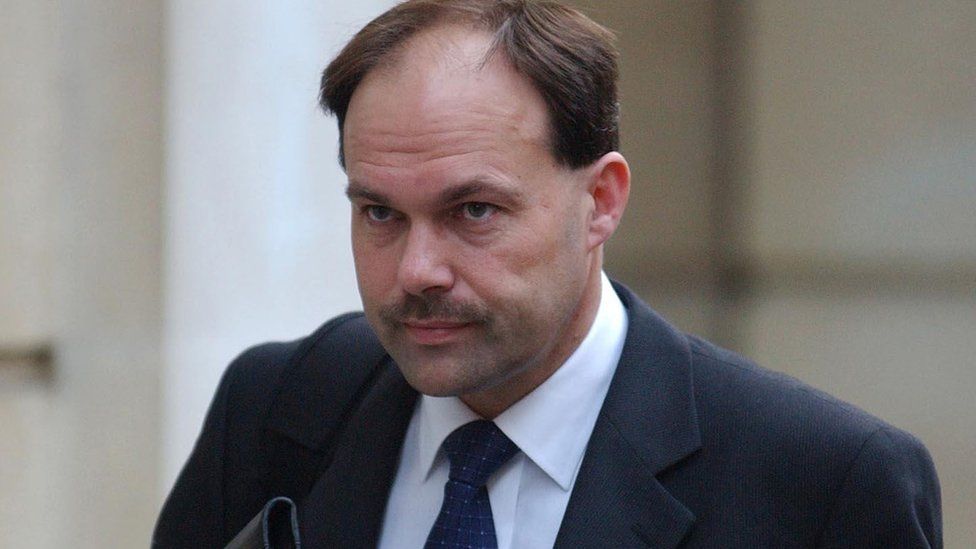
Glyn Razzell was found guilty of his wife’s murder at a trial in 2003
By Richard Greenaway and Sarah-Jane Bungay
BBC News
A man who murdered his wife has refused to reveal where her remains are.
Glyn Razzell, 64, from Somerset, is serving a life sentence for the murder of his wife Linda, who vanished on the way to work in Swindon in 2002.
He was refused release at a 2022 parole hearing under Helen’s Law, which makes it harder for killers to get parole if they do not say where the victim is.
Razzell has now told a new hearing he could not reveal where his wife is as he “does not know” she is dead.
Razzell did not appear in person at the public hearing, but was connected via a remote link.
Mrs Razzell, a 41-year-old mother-of-four, was living in Highworth, Wiltshire, at the time she disappeared.
More than 20 years on, she has not been seen since, and her body has never been found.
Her husband’s trial heard he and his wife were embroiled in divorce proceedings, and he faced a financial settlement he was not prepared to accept.
When questioned by the parole panel about the location of his wife’s body, he said: “I don’t know where Linda’s remains are – I don’t know if she’s dead for sure – I’m sorry if that upsets people.”
Image source, Wiltshire Police
Linda Razzell, originally from Carmarthenshire, disappeared in 2002 and her body has never been found
The panel told Razzell the couple’s children had been grieving for many years and want to arrange a burial.
“You, and you alone are the barrier to completing this,” he was told.
Razzell replied: “I do understand the anguish. I understand the way they feel. If there is anything I could do, I really would.”
When questioned by the panel about episodes of arguing at the time of her disappearance, Razzell said: “She wanted attention from me and I didn’t want to give it to her.”
He was read testimony of alleged violent behaviour towards his wife, but denied it happened.
When questioned over whether he had threatened his wife with violence, or withheld money from her, Razzell said he had not.
Image source, Google
Mrs Razzell was last seen alive parking her car on Alvescot Road in Swindon in March 2002
And when asked if he was angry about the fact he had been made redundant from his job, or jealous about his wife’s new partner, Razzell said: “I was sad, not angry.”
He added: “I went through a period of being depressed when Linda first filed for divorce.
“I was really suffering badly from insomnia. I was worried about my children and not seeing them every day was by far the worst part of the divorce – not money or her infidelity. “
‘Blood placed in car’
He was asked about Mrs Razzell’s blood being found in a car he had borrowed from a friend, which was used for all of Razzell’s journeys on the day his wife disappeared.
“I don’t think the blood was in the car,” Razzell said.
“I think the blood was placed there to incriminate me – it must have been with Linda’s help because it was fresh blood.”
He was asked three times by the panel why he killed his wife.
“I did not kill Linda,” he replied each time.
Broke composure
Razzell answered all the questions in a calm, clear voice but his composure broke for the first time when he explained why he had chosen not to hear the victim impact statements from his children read out loud. “I knew that it would unbalance me,” he said.
“I was upset at the source of those comments and where they had come from. “I carry photos of my children wherever I go and although they are not up to date they are always with me.”I had read the statement and know the effect they have on me – it’s a heavy burden to know that they feel that way about me.”
Image source, PA Media
The hearing is taking place at the Royal Courts of Justice in London
The hearing, the third Razzell has been granted, is taking place at the Royal Courts of Justice in the Strand, with members of the public able to watch.
His trial in 2003 heard that Mrs Razzell left her home in the village of Highworth, near Swindon, at 08:45 BST on 19 March with her children and boyfriend, Greg Worrall.
She dropped Mr Worrall off in Highworth and her children at school before being seen parking for work in Alvescot Road, as usual.
She is believed to have taken her usual route down an alleyway towards the college and her phone was found in a recess of the alleyway the next day during a police search.
Her boyfriend contacted police on the evening of her disappearance after she failed to pick up her children from their after-school club.
Razzell was convicted of her murder and lost an appeal against his conviction in 2005.
The parole board hearing was told a decision on his possible release will be made in two weeks.
Follow BBC West on Facebook, Twitter and Instagram. Send your story ideas to: bristol@bbc.co.uk








